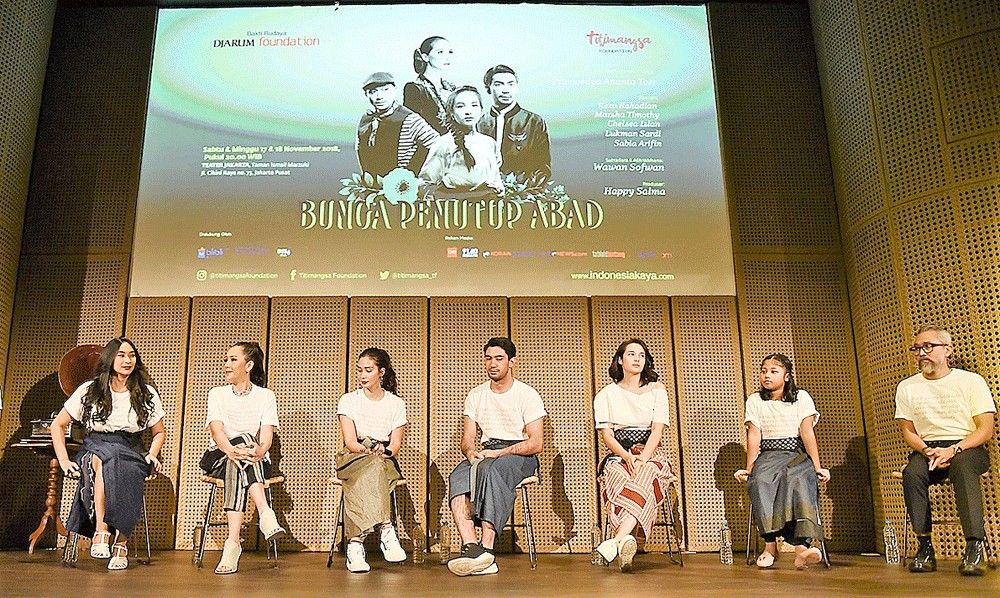'Bunga Penutup Abad' reevaluates Pramoedya's legacy
Bunga Penutup Abad will not only burnish the world of Indonesian theater, but also Pramoedya’s legacy.
Change Size
 Into the play: The team behind the upcoming play Bunga Penutup Abad (The Flower that Ends a Century), including Reza Rahadian (center) and Marsha Timothy (third left) pose together. The play will be staged for the third time at Teater Jakarta in the Taman Ismail Marzuki arts center in Jakarta on Nov. 17 and 18. (Courtesy of ImageDynamics /-)
Into the play: The team behind the upcoming play Bunga Penutup Abad (The Flower that Ends a Century), including Reza Rahadian (center) and Marsha Timothy (third left) pose together. The play will be staged for the third time at Teater Jakarta in the Taman Ismail Marzuki arts center in Jakarta on Nov. 17 and 18. (Courtesy of ImageDynamics /-)
E
ven if Pramoedya Ananta Toer, the great Indonesian writer, had — hypothetically — never asked to be remembered in any way, he always will be.
In 2016 and 2017, the play Bunga Penutup Abad (The Flower that Ends a Century), a retelling of Pramoedya’s Bumi Manusia (This Earth of Mankind) and Anak Semua Bangsa (Child of All Nations), was staged twice in Jakarta and Bandung – with Reza Rahadian as Minke, Happy Salma as Nyai Ontosoroh, Chelsea Islan as Annelies, Lukman Sardi as Jean Marais and Sabia Arifin as May Marais.
On Nov. 17 and 18, Bunga Penutup Abad will be staged for the third time at Teater Jakarta in the Taman Ismail Marzuki arts center in Jakarta, with Wawan Sofwan returning as director.
Attempts to re-litigate the ills of Pramoedya’s own country have been a success: Previous shows saw full houses.
“[The play] is the longest production,” said Renitasari Adrian, the program director of the Bakti Budaya Djarum Foundation, who with Happy’s Titimangsa Production will produce the play.
Although the play received slight narrative tweaks, the actors will reprise their roles, except for Happy, who passes on the baton to actress Marsha Timothy, whose first role in a play was in Agus Noor’s Perempuan-Perempuan Chairil (Chairil’s Women).
“When Happy asked me to play Nyai Ontosoroh, I said, sure,” Marsha said before adding that it took her three days to decide and the positive conviction of her friends. Why? “I know how powerful this character is.”
Bumi Manusia and Anak Semua Bangsa chronicle the life of Minke, who blossoms into a journalist in the colonial era and becomes smitten with Annalies, Nyai Ontosoroh’s daughter.
Like the novels, the character Nyai Ontosoroh is a self-made woman — denying her concubine past in favor of strength and independence. Wawan certainly knows what the character means to him.
Marsha was his pick out of the dozens of actors that Happy had considered for the role.
He saw the same strength between Nyai Ontosoroh and Marsha’s career-defining character as Marlina, from Mouly Surya’s Marlina the Murderer in Four Acts.
With Marsha’s rehearsals starting before anyone else’s, he made sure that her regimen was similar to Happy’s back in the day: jogging while reciting lines, for instance.
“It’s a blessing to [direct] the third event,” Wawan said.
For Reza Rahadian, the weight of such a formidable character wasn’t lost on him, but much of the script was already scrubbed from his head. “I only remember just a little bit,” he said, referring to the blocking techniques.
Bunga Penutup Abad will not only burnish the world of Indonesian theater, but also Pramoedya’s legacy.
The surplus that Titimangsa received from the previous shows, according to Happy, was used to fund an exhibition called Namaku Pram: Catatan dan Arsip (My Name Is Pram: Notes and Archive) that was held this year at the dia.lo.gue gallery featuring copies of Pramoedya’s books and letters.
Pramoedya’s name, etched in history books, wrote the Buru Quartet — of which Bumi Manusia and Anak Semua Bangsa are a part) and many other books.
With awards like the PEN/Barbara Goldsmith Freedom to Write Award, his writing prowess and his empathy — toward the poor, toward Chinese-Indonesians — place him in the pantheon of the great Indonesian writers.
His legacy also preoccupies Renitasari. “There’s still a lot of people out there who don’t know who he is,” she said.
Reza would agree. “I hope Pram’s work keeps adorning the world of theater,” he said.









